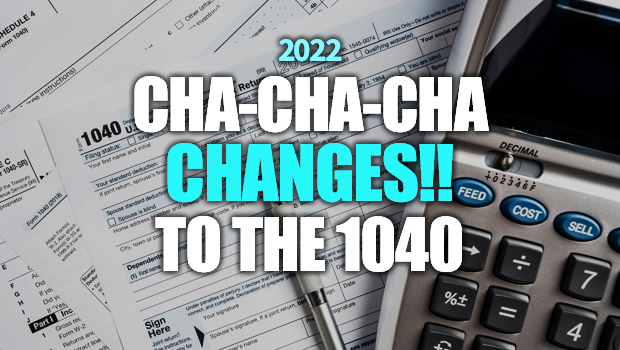Form 1040 is the standard IRS form when it comes to filing federal income taxes as an individual. Over the years, Form 1040 has been modified to reflect changes in tax law and IRS practice. In some years, Form 1040 saw more changes than other years. The changes from the 2020 Form 1040 to the 2021 Form 1040 aren’t major, but there are still plenty of updates. Let’s take a look at three of the more notable changes for the upcoming tax filing season.
Change #1: Child Tax Credit
On page two of Form 1040, there’s a change to Line 28. This is due to a change to Schedule 8812, which reflects the advance child tax credit payments that went out to taxpayers in the middle of 2021.
Depending on the taxpayer’s tax situation for the 2021 calendar year, they could find themselves having to repay the IRS some of this money. There’s also a chance that no repayment is necessary, but the taxpayer could receive a smaller-than-expected child tax credit when they file their taxes in early 2022.
Change #2: Virtual Currency
One of the more publicized changes to Form 1040 over the past few years is the way IRS is handling virtual currency. With more and more people investing in virtual currency (which includes cryptocurrencies, like Bitcoin), the potential for taxable income has gone up. Not wanting to be left out, the IRS modified Form 1040 to identify taxpayers who may have reportable income due to their virtual currency transactions.
The earlier wording on Form 1040 left a bit to be desired. For example, on Form 1040 from 2020, the virtual currency question read, “At any time during 2020, did you receive, sell, send, exchange, or otherwise acquire any financial interest in any virtual currency?” Taxpayers were then given the option to respond with a “yes” or “no” answer.
If the taxpayer only purchased virtual currency with real money (and did not sell virtual currency), they were supposed to answer “no” to the above question on 2020’s Form 1040. This is because acquiring virtual currency (through a purchase) would not be enough to trigger a virtual currency income tax obligation for most taxpayers. However, answering “no” would seemingly be lying to the IRS because a purchase of virtual currency would be the same as acquiring a financial interest in virtual currency.
To help clear things up, Form 1040 for 2021 now reads, “At any time during 2021, did you receive, sell, exchange, or otherwise dispose of any financial interest in any virtual currency?”
The key change is replacing the word “acquire” with the word, “dispose.” You generally don’t have to pay income taxes on any positive changes in your cryptocurrency investment until you sell your virtual currency.
Change #3: Deductions for Charitable Contributions
For the 2020 tax year, the line on Form 1040 where taxpayers would put their charitable contributions (if taking the standard deduction) was located above the adjusted gross income amount. But 2021’s Form 1040 moved this charitable contribution line below the adjusted gross income line. As a result, a taxpayer’s charitable contributions in 2021 would no longer affect his or her adjusted gross income. This matters because someone’s adjusted gross income is often a key number used to determine eligibility for tax benefits and state or local income tax liability.
In Summary
The above is just a brief look at some of the changes to the new 1040 for 2021. There are many other modifications, especially to Schedules 1, 2 and 3. To learn more about Form 1040 for the 2021 tax year, contact your tax preparation professional.
The good news is Kienitz Tax Law is here to help you with your tax issues. Schedule your FREE consultation today!

